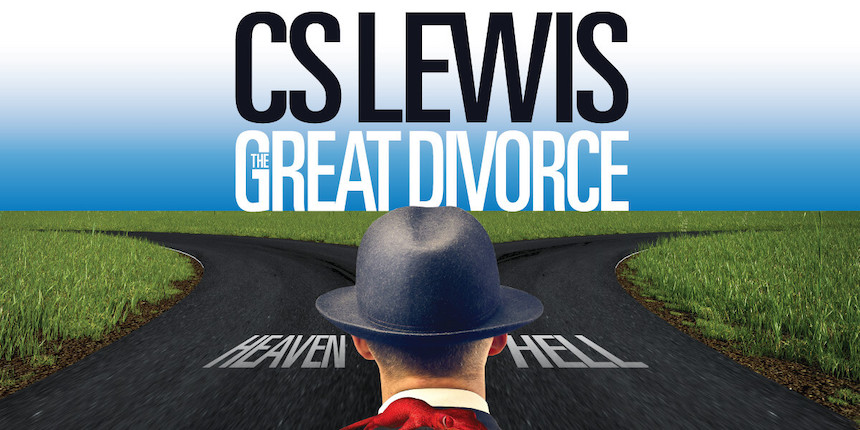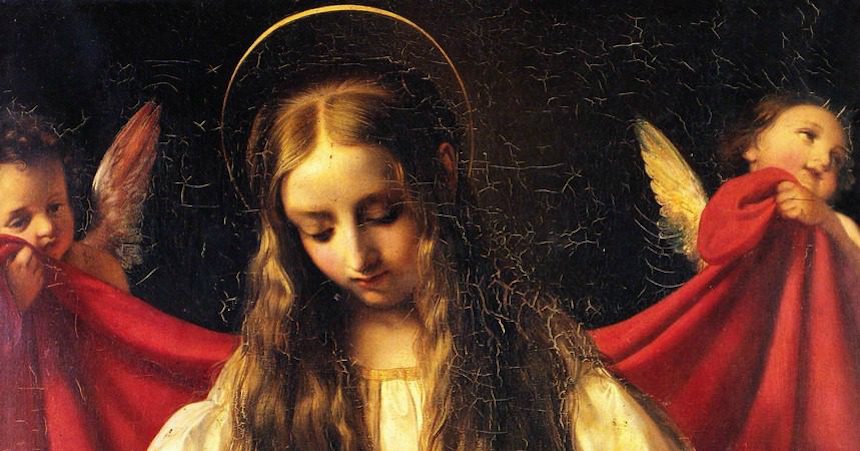
Summary
Lewis then recounts “one of the most painful meetings” between a ghostly woman named Pam and a Bright Spirit, Reginald, her brother. The ghost is disappointed, expecting instead her son, Michael. Reginald tells her he’s far up in the mountains and explains that she would appear invisible to him at this point, but this would be remedied shortly: “As soon as it’s possible for him to see you, of course he will”. Reginald explains that the first step in this process is rather hard, that she will become solid enough “when you learn to want someone else besides Michael… the little germ of a desire for God that we need to start the process.”
Although rather annoyed at the thought of “religion and all that sort of thing”, she’s willing to do what’s necessary to see her son. Reginald explains this approach is futile, since she’s “treating God only as a means to Michael. But the whole thickening treatment consists in learning to want God for His own sake.” Pam replies that he “wouldn’t talk like that if you were a Mother”, but Reginald explains that she has reduced herself to being only a mother. She was “Michael’s mother only because you first exist as God’s creature”.
Pam then declares that “If [God] loved me He’d let me see my boy” and objects that God had let Michael die. Reginald explains that this was necessary, firstly for Michael’s sake since his mother could never make him truly happy, and secondly for her sake, in an effort to transform her “merely instinctive love…into something better… to love Michael as [God] understands love”. Since Pam’s maternal instinct “was uncontrolled and fierce and monomaniac”, God took him so that “in the loneliness, in the silence, something else might begin to grow.”
These critical comments about “Mother-love” are poorly received by the ghost, who declares it to be “the highest and holiest feeling in human nature”. Reginald responds that “no natural feelings are high or low, holy or unholy, in themselves. They are all holy when God’s hand is on the rein. They all go bad when they set up on their own and make themselves into false gods.” Pam is adamant that her “love for Michael would never have gone bad”. But Reginald points out that she must have met mothers who are united with their sons in the Grey Town but who are still unhappy. She had indeed, but is convinced that this would never happen with her and Michael.
Reginald says that living only for Michael’s memory was a mistake, and this made her husband (Dick) and her daughter (Muriel) miserable. Pam protests saying they didn’t care, but Reginald refutes this. Becoming melodramatic, Pam indignantly replies “Oh, of course. I’m wrong. Everything I say or do is wrong, according to you.” With mirth in his eyes, the Spirit says that this is “what we all find when we reach this country. We’ve all been wrong! …There’s no need to go on pretending one was right! After that we begin living.”
Angry at the humour, Pam demands her son: “He is mine, do you understand? Mine, mine, mine, for ever and ever.” Reginald replies that “Everything will be yours. God himself will be yours. But not that way”. After pointing out that Michael was originally “an Accident”, Pam says “I hate your religion and I hate and despise your God. I believe in a God of Love.” Reginald points out that, she is the one who has love neither for him nor even for her own mother. When Pam thinks his feelings are hurt, the Spirit laughs and replies that she can’t hurt anyone in this country. Lewis tells us that “The Ghost was silent and open-mouthed for a moment; more wilted, I thought, by this reassurance than by anything else that had been said”
MacDonald leads Lewis away, saying that the conversation is likely to take a while, but that he can now see the choice that is presented to the ghosts. Lewis asks about natural feelings and MacDonald says that “There’s something in natural affection which will lead it on to eternal love more easily than natural appetite could be led on. But there’s also something in it which makes it easier to stop at the natural level and mistake it for the heavenly… And if it finally refuses conversion its corruption will be worse… It is a stronger angel, and therefore, when it falls, a fiercer devil…”. He explains that “Every natural love will rise again and live forever in this country: but none will rise again until it has been buried.”
They then see a Ghost with a little red lizard sitting on his shoulder, whispering things in his ear. The Ghost angrily tells it to shut up, but the lizard continues unabated. The ghost turns to limp away from the mountains.
The ghost meets and angel. The ghost says that the lizard refuses to be quiet, so he’s going home. The angel asks him if he would like to make the lizard quiet. When the ghost says he would, the angel steps forward to kill it, causing the ghost to retreat. The ghost downplays the issue. He says he was only thinking about silencing it. He procrastinates. He says he’s sure it’ll be quiet now and that the gradual process would be better. He complains of ill health. The Angel rejects all these excuses and repeatedly asks if he can kill the lizard. The ghost is convinced he’ll die and says the angel is already hurting him. The Angel replies “I never said it wouldn’t hurt you. I said it wouldn’t kill you.” The ghost complains that the Angel should have killed the lizard without asking, but the Angel responds “I cannot kill it against your will. It is impossible. Have I your permission?”
The Lizard starts chattering to the Ghost, saying that the Angel really can kill him and that, if this happens, the ghost would be all alone and that he promises to be good. Facing a life constantly harassed by the lizard, the ghost gives his permission. The Angel closes his hands around the reptile, the ghost screams and the lizard is flung with its back broken on the turf.
The Ghost begins to become more solid, “an immense man, naked, not much smaller than the Angel”. At the same time, the lizard transforms into a great stallion. The man flings himself at the feet of the Angel and then rises, leaping on the horse’s back and races off towards the mountain. Lewis says that “the whole plain and forest were shaking with a sound… the voice of that earth, those woods and those waters”.
Lewis asks MacDonald “…does it mean that everything… that is in us can go on to the Mountains?”. His Teacher responds that “Nothing… can go on as it now is… [it] will not be raised again if it submits to death… Flesh and blood cannot come to the Mountains. Not because they are too rank, but because they are too weak. What is a Lizard compared with a stallion? Lust is a poor, weak, whimpering whispering thing compared with that richness and energy of desire which will arise when lust has been killed.”
Lewis tries to understand how “this man’s sensuality proved less of an obstacle than that poor woman’s [excess of] love for her son”. MacDonald immediately rejects this, saying that “There was no excess, there was defect. She loved her son too little, not too much… it may well be that at this moment she’s demanding to have him down with her in Hell. That kind is sometimes perfectly ready to plunge the soul they say they love in endless misery if only they can still in some fashion possess it” MacDonald says that Lewis must draw another lesson: “Ye must ask, if the risen body even of appetite is as grand a horse as ye saw, what would the risen body of maternal love or friendship be?”
Questions
Q1. Why is the Motherly Ghost disappointed? What prevents her from growing solid?
Q2. Why are we told God took her son? How do you square this with “a God of love”.
Q3. What was wrong about Pam’s relationship with her son. Why does MacDonald rebuke Lewis for saying that this mother has “an excess of love”?
Q4. What was wrong about Pam’s relationship with her other family members?
Q5. How does this chapter relate to the material covered in “The Four Loves”? How can good things go wrong?
Q6. What does the lizard represent? Why does the ghost resist to its death? What excuses does the ghost make? Why is the ghost’s permission required?
Q7. How does the lizard attempt to argue for its own survival?
Q8. What happens to the lizard? What does this mean? What does MacDonald when he says that everything must submit to death in order to live in this world?
Previous Chapter | Index | Next Chapter













